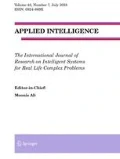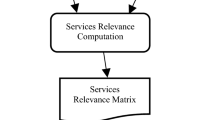Abstract
We present a QoS-aware recommender approach based on probabilistic models to assist the selection of web services in open, distributed, and service-oriented environments. This approach allows consumers to maintain a trust model for each service provider they interact with, leading to the prediction of the most trustworthy service a consumer can interact with among a plethora of similar services. In this paper, we associate the trust in a service to its performance denoted by QoS ratings instigated by the amalgamation of various QoS metrics. Since the quality of a service is contingent, which renders its trustworthiness uncertain, we adopt a probabilistic approach for the prediction of the quality of a service based on the evaluation of past experiences (ratings) of each of its consumers. We represent the QoS ratings of services using different statistical distributions, namely multinomial Dirichlet, multinomial generalized Dirichlet, and multinomial Beta-Liouville. We leverage various machine learning techniques to compute the probabilities of each web service to belong to different quality classes. For instance, we use the Bayesian inference method to estimate the parameters of the aforementioned distributions, which presents a multidimensional probabilistic embodiment of the quality of the corresponding web services. We also employ a Bayesian network classifier with a Beta-Liouville prior to enable the classification of the QoS of composite services given the QoS of its constituents. We extend our approach to function in an online setting using the Voting EM algorithm that enables the estimation of the probabilities of the QoS after each interaction with a web service. Our experimental results demonstrate the effectiveness of the proposed approaches in modeling, classifying and incrementally learning the QoS ratings.













Similar content being viewed by others
References
Abdul-Rahman A, Hailes S (2000) Supporting trust in virtual communities. In: Proceedings of the 33rd annual hawaii international conference on system sciences. pp 1–9
Abedinzadeh S, Sadaoui S (2014) A trust-based service suggestion system using human plausible reasoning. Appl Intell 1–21. doi:10.1007/s10489-013-0495-8
Al-Masri E, Mahmoud Q (2007) QoS-based discovery and ranking of web services. In: Proceedings of the 16th international conference on computer communications and networks (ICCCN’ 2007). pp 529–534
Artz D, Gil Y (2007) A survey of trust in computer science and the semantic web. Web Semant 5:58–71
Bauer E, Koller D, Singer Y (1997) Update rules for parameter estimation in bayesian networks. In: Proceedings of the 13th conference on uncertainty in artificial intelligence (UAI). Morgan Kaufmann, pp 3–13
Bishop C M (2006) Pattern recognition and machine learning (information science and statistics). Springer, New York
Bouguila N (2008) Clustering of count data using generalized dirichlet multinomial distributions. IEEE Trans Knowl Data Eng 20(4):462–474
Bouguila N (2011) Count data modeling and classification using finite mixtures of distributions. IEEE Trans Neural Netw 22(2):186–198
Bouguila N, Ziou D, Monga E (2006) Practical bayesian estimation of a finite beta mixture through gibbs sampling and its applications. Stat Comput 16(2):215–225
Bronstein R, Cohen I, Cozman FG, Cozman FG, Politecnica E, Fabio AB (2001) Adaptive online learning of bayesian network parameters. Technical Report, HP Laboratories Palo Alto
Buntine W (1991) Theory refinement on bayesian networks. In: Proceedings of the seventh conference on uncertainty in artificial intelligence. Morgan Kaufmann, pp 52–60
Chen M, Chen ANK, Shao BBM (2003) The implications and impacts of web services to electronic commerce research and practices. J Electron Commer Res 4(4):128–139
Connor R J, Mosimann J E (1969) Concepts of independence for proportions with a generalization of the dirichlet distribution. J Am Stat Assoc 64(325):194–206
Dempster A P, Laird N M, Rubin D B (1977) Maximum likelihood from incomplete data via the em algorithm. J R Stat Soc Ser B 39(1):1–38
2012) Institution-governed cross-domain agent service cooperation: a model for trusted and autonomic service cooperation. Appl Intell 37(2):223–238. doi:10.1007/s10489-011-0323-y
Hang C-W, Singh M P (2011) Trustworthy service selection and composition. ACM Trans Auton Adapt Syst 6(1):5:1–5:17
Heckerman D (1999) A tutorial on learning with bayesian networks. In: Jordan MI (ed) Learning in graphical models. MIT Press, Cambridge, pp 301–354
Heckerman D, Geiger D, Chickering D M (1995) Learning bayesian networks: the combination of knowledge and statistical data. Mach Learn 20(3):197–243
Jensen F V, Lauritzen S L, Olesen K G (1990) Bayesian updating in causal probabilistic networks by local computations. Comput Stat Q 4(4):269–282
Josang A, Haller J (2007) Dirichlet reputation systems. In: Proceedings of the the second international conference on availability, reliability and security. IEEE Computer Society, pp 112–119
Jøsang A, Ismail R, Boyd C (2006) A survey of trust and reputation systems for online service provision. Decis Support Syst 43(2):618–644
Khosravifar B, Bentahar J, Moazin A (2010) Analyzing the relationships between some parameters of web services reputation. In: Proceedings of the IEEE international conference on web services (ICWS). pp 329–336
Khosravifar B, Bentahar J, Moazin A, Maamar Z, Thiran P (2010) Analyzing communities vs. single agent-based web services: trust perspectives. In: Proceedings of the IEEE international conference on services computing (SCC). pp 194–201
Koohborfardhaghighi S, Kim J (2013) Using structural information for distributed recommendation in a social network. Appl Intell 38(2):255–266
Li L, Wang Y (2011) A subjective probability based deductive approach to global trust evaluation in composite services. In: Proceedings of the international conference on web services (ICWS), pp 604–611
Liu M, Wang M, Shen W, Luo N, Yan J (2012) A quality of service (QoS)-aware execution plan selection approach for a service composition process. Futur Gener Comput Syst 28(7):1080–1089
Liu X, Bouguettaya A, Yu Q, Malik Z (2001) Efficient change management in long-term composed services. Serv Oriented Comput Appl 5:87–103
Lochner R H (1975) A generalized dirichlet distribution in bayesian life testing. J R Stat Soc Ser B (Methodological) 37(1):103–113
Madsen R E, Kauchak D, Elkan C (2005) Modeling word burstiness using the dirichlet distribution. In: Proceedings of the 22nd international conference on machine learning. pp 545–552
Malik Z, Akbar I, Bouguettaya A (2009) Web services reputation assessment using a hidden markov model. In: Proceedings of the 7th international joint conference on service-oriented computing. Springer, Berlin, ICSOC-ServiceWave, pp 576–591
Mehdi M, Bouguila N, Bentahar J (2012) Trustworthy web service selection using probabilistic models. In: Proceedings of the 19th international conference on web services (ICWS). pp 17–24
Mosimann J E (1962) On the compound multinomial distribution, the multivariate β-distribution, and correlations among proportions. Biometrika 49(1/2):65–82
Ramchurn S D, Huynh D, Jennings N R (2004) Trust in multi-agent systems. Knowl Eng Rev 19:1–25
Reece S, Rogers A, Roberts S, Jennings N R (2007) Rumours and reputation: evaluating multi-dimensional trust within a decentralised reputation system. In: Proceedings of the 6th international joint conference on autonomous agents and multi-agent systems. AAMAS, pp 165:1–165:8
Rettinger A, Nickles M, Tresp V (2010) Statistical relational learning of trust. Mach Learn 82(2):191–209
Sabater J, Sierra C (2005) Review on computational trust and reputation models. Artif Intell Rev 24:33–60
Sim K M (2012) Agent-based cloud computing. IEEE Trans Serv Comput 5(4):564–577
Teacy W T L, Patel J, Jennings N R, Luck M, Systems M (2005) Coping with inaccurate reputation sources: experimental analysis of a probabilistic trust model. In: Proceedings of the 4th international joint conference on autonomous agents and multi-agent systems (AAMAS). pp 997–1004
Tserpes K, Aisopos F, Kyriazis D, Varvarigou T A (2012) A recommender mechanism for service selection in service-oriented environments. Futur Gener Comput Syst 28(8):1285–1294
Vu L, Hauswirth M, Aberer K (2005) QoS-based service selection and ranking with trust and reputation management. In: Proceedings of the cooperative information system conference. pp 446–483
Wang X, Liu L, Su J (2012) Rlm: a general model for trust representation and aggregation. IEEE Trans Serv Comput 5(1):131–143
Wang Y, Vassileva J (2003) Bayesian network trust model in peer-to-peer networks. In: Proceedings of the 2nd international workshop on peers and peer-to-peer computing. pp 23–34
Wang Y, Vassileva J (2007) Toward trust and reputation based web service selection: a survey. Int Trans Syst Sci Appl 3(2)
Winkler R (1967) The assessment of prior distributions in bayesian analysis. J Am Stat Assoc 62(319):776–800
Wu Q, Zhu Q (2013) Transactional and QoS-aware dynamic service composition based on ant colony optimization. Futur Gener Comput Syst 29(5):1112–1119
Yahyaoui H (2012) A trust-based game theoretical model for web services collaboration. Knowl-Based Syst 27:162–169
Yahyaoui H, Maamar Z, Lim E, Thiran P (2013) Towards a community-based, social network-driven framework for web services management. Futur Gener Comput Syst 29(6):1363–1377
Yazidi A, Granmo O-C, Oommen B (2012) Service selection in stochastic environments: alearning-automaton based solution. Appl Intell 36(3): 617–637. doi:10.1007/s10489-011-0280-5
Yu B, Singh M P (2000) A social mechanism of reputation management in electronic communities. In: Proceedings of 4th international workshop on cooperative information agents. pp 154– 165
Yu B, Singh M P (2003) Detecting deception in reputation management. In: Proceedings of the 2nd international joint conference on autonomous agents and multi-agent systems (AAMAS). pp 73–80
Zacharia G (2000) Trust management through reputation mechanisms. Appl Artif Intell 14:881–907
Zhang N L, Poole D (1994) A simple approach to bayesian network computations. In: Proceedings of the 10th Canadian conference on artificial intelligence. pp 171–178
Author information
Authors and Affiliations
Corresponding author
Rights and permissions
About this article
Cite this article
Mehdi, M., Bouguila, N. & Bentahar, J. Probabilistic approach for QoS-aware recommender system for trustworthy web service selection. Appl Intell 41, 503–524 (2014). https://doi.org/10.1007/s10489-014-0537-x
Published:
Issue Date:
DOI: https://doi.org/10.1007/s10489-014-0537-x




